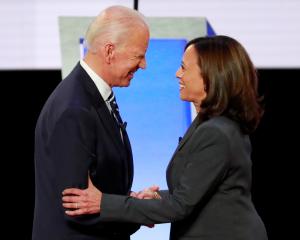
US President Donald Trump on Sunday (local time) backtracked on his push for a cyber security unit with Russia, tweeting that he did not think it could happen, hours after his proposal was harshly criticised by Republicans who said Moscow could not be trusted.
Trump said on Twitter early on Sunday that he and Russian President Vladimir Putin discussed on Friday forming "an impenetrable Cyber Security unit" to address issues like the risk of cyber meddling in elections.
The idea appeared to be a political non-starter. It was immediately scorned by several of Trump's fellow Republicans, who questioned why the United States would work with Russia after Moscow's alleged meddling in the 2016 US election.
Tweeting after his first meeting with President Vladimir Putin on Friday, Trump said now was the time to work constructively with Moscow, pointing to a ceasefire deal in southwest Syria that came into effect on Sunday.
"Putin & I discussed forming an impenetrable Cyber Security unit so that election hacking, & many other negative things, will be guarded and safe," he said following their talks at a summit of the Group of 20 nations in Hamburg, Germany.
Three Republican senators - Lindsey Graham of South Carolina, John McCain of Arizona and Marco Rubio of Florida - blasted the idea.
"It's not the dumbest idea I have ever heard but it's pretty close," Graham told NBC's Meet the Press program, saying that Trump's apparent willingness to "forgive and forget" stiffened his resolve to pass legislation imposing sanctions on Russia.
"There has been no penalty," McCain, who chairs the Senate armed services committee, told CBS' Face the Nation program according to a CBS transcript. "Vladimir Putin ... got away with literally trying to change the outcome ... of our election."
"Yes, it's time to move forward. But there has to be a price to pay," he added.
Rubio, on Twitter, said: "Partnering with Putin on a 'Cyber Security Unit' is akin to partnering with (Syrian President Bashar al) Assad on a 'Chemical Weapons Unit'."
Trump argued for rapprochement with Moscow in his campaign but has been unable to deliver because his administration has been dogged by investigations into the allegations of Russian interference in the election and ties with his campaign.
Special Counsel Robert Mueller is investigating the matter, including whether there may have been any collusion on the part of Trump campaign officials, as are congressional committees including both the House and Senate intelligence panels.
Those probes are focused almost exclusively on Moscow’s actions, lawmakers and intelligence officials say, and no evidence has surfaced publicly implicating other countries despite Trump's suggestion that others could have been involved.
Moscow has denied any interference, and Trump says his campaign did not collude with Russia.
Representative Adam Schiff, the top Democrat on the House Intelligence Committee, told CNN's State of the Union program Russia could not be a credible partner in a cyber security unit.
"If that’s our best election defense, we might as well just mail our ballot boxes to Moscow," Schiff added.
Separately, US government officials said that a recent hack into business systems of US nuclear power and other energy companies was carried out by Russian government hackers, the Washington Post reported on Saturday.












